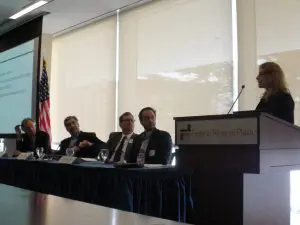Highlights: Envisioning Our Energy Future Forum
Acadia Center held a forum on Envisioning Our Energy Future in Boston on February 24th. The event was intended to help foster thought-leadership in the energy space, bringing together stakeholders and experts for a discussion of timely topics, with three panels and a lunch speaker.
A highlight of the day was the keynote presentation by Klaus Vesløv, developer of a smart grid pilot program on the Danish island of Bornholm, the first pilot in the EU to focus on how customer behavior impacts grid modernization efforts. The ECOGRID pilot is one of the foundations for fulfilling the Bornholm strategy of being 100% fossil free by 2025, and becoming a Bright Green Island. With Denmark as a whole setting the goal to be fossil free by 2050, reforms are underway to use wind turbines as the foundation of the grid and electrify heating and transportation. Mr. Vesløv shared inspiring ideas and lessons from his work on this project.

The three panels of the day featured presentations from stakeholders with a wide range of expertise in the energy fields, and discussions of:
- visions of the future and identify key steps to achieving it
- recent examples of competition and reduce transmission and distribution costs
- current efforts to utilize targeted efficiency investments and consider challenges to efficiency program design and implementation
Full agenda and presentations available here.

The event was also a public debut for Acadia Center’s UtilityVision, which provides comprehensive recommendations for decision-makers to advance a modern, consumer-friendly and environmentally-friendly electric grid. These recommendations contributed to the conversation at the event.
Acadia Center is grateful to the panelists and attendees who made this day a success and looks forward to more events in the future.

Announcing UtilityVision: Empowering Consumers for a Clean Energy Future
UtilityVision is here! This publication frames an ambitious but realistic energy future that puts the consumer firmly in the center to allow them greater freedom and control over energy costs. UtilityVision presents a comprehensive regulatory framework for a modern energy system that revolves around the consumer and propels us toward our climate and economic goals.

There are five key areas for reform:
- Empowering the consumer: Consumers are the most important constituent of our energy system. The modern grid should meet their full energy needs: provide affordable and reliable energy, give them real control over their energy use and costs, help them enjoy the benefits of innovation, and treat all consumers fairly.
- Planning a consumer-focused power grid: Grid planning must merge the traditional world of “poles and wires” with available new technologies and modern strategies.
- Aligning utility incentives with consumer and environmental goals: Regulation of the power grid needs to change to provide utilities with the financial incentives that will achieve the goals of increased consumer control and decreased GHG emissions.
- Helping consumers pay for power they use: Electric bills should be designed to empower consumers to make smart energy and economic decisions to save money and energy.
- Paying consumers for power they produce: Consumers using local renewable energy resources—through distributed generation like rooftop solar–should be charged based on the costs of staying connected to the grid and credited for the full range of benefits they provide.
UtilityVision addresses one core part of Acadia Center’s vision a clean energy system that will drive down carbon emissions. It outlines a pathway and detailed policy recommendations for stakeholders and regulators to modernize the way we plan, manage and invest in the power grid. This approach addresses utility business models, rate-making and customer-side energy resources together. UtilityVision follows on Acadia Center’s EnergyVision (2014) which charts out reforms in four interconnected areas to produce a cleaner, lower cost energy system and reach 80 percent carbon emission reductions by 2050.
Press release announcing UtilityVision here.
Forum: Envisioning Our Energy Future, Boston, 2/24
Please join Acadia Center in Boston on February 24th for a public forum: Envisioning Our Energy Future. The event is intended to help foster thought-leadership in the energy space, bringing together stakeholders and experts for a discussion of timely topics, with three panels and a lunch speaker.
Where: Federal Reserve Plaza/600 Atlantic Avenue, Connolly Center, Harborside 4th Floor
When: February 24th, 10AM-3:30PM
Lunch provided
To attend & for more information: https://www.eventbrite.com/e/envisioning-our-energy-future-tickets-15275579670
Keynote (Lunch) Speaker
Klaus Veslov of EcoGrid EU, is the developer of a E23 million smart grid pilot program on the Danish island of Bornhom—the first pilot in the EU to focus on how customer behavior impacts grid modernization efforts. The EcoGrid pilot program is a core strategy for the Bornholm goal of being 100% fossil fuel free by 2025. For more information: http://www.eu-ecogrid.net/eogrid-eu/the-bornholm-test-site
Panels
I. Utility of the Future
The advancement of viable, distributed energy technologies in the marketplace is happening quickly. Technology changes in the market are occurring faster than the regulatory structures governing the utilities. There is a vast opportunity to structure a new energy system that embraces decentralized energy technologies. This panel will be asked to describe their vision of the future and identify key steps to achieving it.
Panelists: Nathan Adams, Green Mountain Power; Tim Woolf, Synapse Energy Economics, Inc; Jonathan Schrag, Guarini Center (NY); Peter Rothstein, New England Clean Energy Council
II. Leveling the Playing Field for Distributed Energy Resources
The current system for planning and paying for the energy system favors poles and wires expenditures over investments to reduce demand for grid-supplied power, driving transmission and distribution costs higher than they would be if “non-wires alternatives” (NWA) could compete on a level playing field. The panel will examine recent examples of utilizing NWAs and explore policy reforms that can facilitate competition and reduce transmission and distribution costs.
Panelists: Amy Boyd, Acadia Center; Fran Cummings, Peregrine Energy Group; Jim Grevatt, Energy Futures Group; Kerrick Johnson, Vermont Electric Power Company
III. The Role for Energy Efficiency and Demand-Side Resources to Reduce Price Pressures in the Energy System
Flexibility in energy efficiency investment programs offers the potential to achieve specific objectives such as serving low-income customers or geographic targeting to defer infrastructure upgrades. This panel will explore current efforts to utilize targeted efficiency investments and consider challenges to efficiency program design and implementation.
Panelists: Jeremy Newberger, National Grid; Eric Wilkinson, ISO-NE; Michael Stoddard, Efficiency Maine Trust; Jeff Schlegel, Efficiency Expert.
Looking Forward -Goals for 2015 and Beyond
Planning ahead in the new year, Acadia Center continues our quest for new solutions to propel us toward a clean energy future, one that can drastically reduce carbon emissions and combat climate change. Looking Forward presents our long-term vision and the current initiatives underway to make that vision a reality.
It all starts with EnergyVision : the framework for a clean energy, low-carbon future focused on using advances in clean electricity – phasing out fossil fuels –to heat buildings and power cars. This clean energy future empowers consumers, lowers greenhouse gas (GHG) emissions and increases economic productivity. EnergyVision demonstrates that reforms achieved simultaneously in four key sectors will help states reach 80% GHG emissions reductions by 2050 – a crucial target for addressing climate change.
To get there, Acadia Center researches, analyzes data and advocates—together with partners and stakeholders—in order to craft and implement needed policy reforms in four areas: electrification of vehicles and buildings; clean renewable energy; power grid modernization; and energy efficiency. We’re forging ahead and working on the ground to reach these specific goals:
- Reduce GHGs in the transportation sector on many fronts with the goal 10% of new passenger vehicle sales in New England to be electric or plug-in hybrid vehicles by 2020 and for transportation fuels sold in New England to be 10% less carbon intensive by 2020;
- Increase investments in high-efficiency electric heat will bring direct savings to consumers and will avoid the risk of over-reliance on fossil fuels and costly investments in transmission infrastructure or pipelines. We’ll continue to advocate efficiency programs that offer incentives to consumers and help increase adoption of cleaner, cost-effective technologies;
- Remove current barriers in the power grid and regulatory system that hinder increased renewable energy. We’ll work to strengthen and expand the Regional Greenhouse Gas Initiative (RGGI) and update renewable portfolio standards (RPS) to increase demand for renewable resources. We must level the playing field so that renewable power can compete fairly and push for market-based solutions that put a price on pollution in order to drive emissions reductions;
- Develop and launch UtilityVision, a comprehensive, regulatory framework that will result in a fully integrated, flexible, low-carbon consumer-friendly energy network. With the right decisions and investments, consumers will have greater control over energy use within and around the buildings they occupy as homes and as businesses. And, this innovative framework put into practice could bring aggressive GHG reductions. (Stay tuned for more on UtilityVision coming soon.)
The transition to new, broadly electrified energy system that is low-carbon, efficient, and consumer-friendly is already moving forward. That future will be achieved more quickly as we adopt forward-looking policies, uproot outdated technologies and apply new ways of thinking about energy options throughout the year.
Support Efficiency Investments for a Clean, Affordable Energy Economy in Rhode Island
Energy efficiency is a “Triple Win” for Rhode Island (RI): it lowers energy bills, increases economic activity from new clean energy jobs, and reduces greenhouse gas emissions. And Rhode Island is a proven leader–tied with Massachusetts in first place for utility energy efficiency programs, and ranked third in the nation overall in the American Council for an Energy Efficient Economy (ACEEE)’s 2014 State Scorecard.
Energy efficiency—a least-cost fuel—is a great deal for the state. Buying electricity from a power plant like the natural-gas fired Manchester Street Station costs between 8¢ and12¢ per kilowatt hour; yet, saving power through energy efficiency actions costs about 4¢ per kilowatt hour. By investing in as much low-cost energy efficiency as possible, RI reduces the cost of doing business in the state leaving consumers with more money in their pockets. Such consumer savings are often spent right in RI– where they can support our local markets, our students, our education and health facilities—while payments to fossil fuel providers head immediately out of state. Every dollar invested in cost-effective energy efficiency boosts the RI Gross State Product an estimated $3.60 and every $1 million invested in energy efficiency generates almost 40 job years of employment.
Building on RI’s great energy efficiency track record, the Public Utilities Commission approved the 2015 Energy Efficiency Program Plan in December and it will accomplish much more for the state:
• Produce over $336 million in net economic benefits to RI homes and businesses
• Save 1.9 million MWh of electricity and 4.8 million MMBTU of natural gas
• Boost Rhode Island’s economy by adding over $417 million to Gross State Product
• Create over 4,500 job-years of employment economy-wide
The cost savings are real! The Division of Public Utilities–the state agency charged with watching out for consumer interests– recently commissioned a research firm, Synapse Energy Economics, to see what efficiency is really doing for our electric bills. The analysis finds that a homeowner who gets a home energy assessment can save approximately 12% on her electric bill by undertaking energy efficiency upgrades. Small business customers, who are eligible for free energy audits, can save as much as 37% to 47% by doing the same.
Importantly, even customers who do nothing to their own houses or offices benefit from their neighbors’ energy efficiency actions. Reducing the state’s demand for power helps lower the costs of the whole energy system, and those savings are passed on to all electric consumers. Energy efficiency is the best strategy for reducing Rhode Islanders’ energy bills, lowering the cost of doing business in the state, and putting money back in the wallets of all consumers. It is a powerful tool to help chart RI’s pathway to a sustainable economy and clean energy future.
FMI: The 2015 Energy Efficiency Plan is part of a larger three-year Least Cost Procurement Plan for 2015, 2016, and 2017 that was approved by the PUC in October.
Energy efficiency investments are one aspect of a clean energy future for Rhode Island. See Acadia Center’s 2015 Legislative Agenda for RI for more policy priorities.
Goals for a Clean Energy Future -Massachusetts Legislative Agenda for 2015
A new Massachusetts Legislature is in session. Acadia Center is ready and focused on a slate of policy initiatives developed to propel the state’s transition to a broadly electrified energy system that is low-carbon, efficient, and consumer-friendly. Massachusetts has made great strides to embrace an energy future that offers lower costs, greater consumer control and significant progress toward state and regional greenhouse gas (GHG) emissions reduction goals. Now it is time to pick up the pace. With advocacy action, stakeholder collaboration and in-depth economic and emissions analysis, Acadia Center is working to ensure success of these proposals, adopt forward-looking policies, uproot outdated technologies and apply new ways of thinking about energy options. Acadia Center calls for action to accomplish the following:
Accelerate Clean Energy Uptake: Ensure clean energy supply, reduce over-reliance on natural gas, and drive regional economic development by supporting proposals that use clean, distributed indigenous energy resources; enable utilities to pursue large-scale competitive procurement of renewable generation; lock in a state target to deploy 1600 megawatts of solar energy by 2020 with a “Value of Solar” utility rate structure; increase the state’s Renewable Portfolio Standard growth rate to attain 20% renewable energy supply by 2020 and 80% by 2050; direct the Department of Public Utilities to promote energy storage technologies.
Advance Electric Vehicles (EVs): With the current mix of energy generation, an EV produces less than half the GHG emissions of a comparable gasoline car. And, EVs provide cost savings for consumers — only 6 cents per mile to drive at current electricity prices — while boosting the regional economy, supporting energy independence, and improving public health. Acadia Center is working with partner organizations and policy leaders to remove barriers to EV adoption: provide incentives, develop a utility framework to increase EV adoptions, build-out charging infrastructure, increase consumer and business education about EVs, and adopt targets for state fleet EV purchases.
Price Carbon Emissions: Markets react quickly and cost-effectively to price signals. The Regional Greenhouse Gas Initiative (RGGI) drove deep reductions in emissions for the power sector more quickly than expected and the economies of participating states grew faster than the rest of the country. Acadia Center is advocating that carbon pricing in Massachusetts should include fossil fuel importers and large emitters (other than power plants currently covered by RGGI) and return revenue to businesses/consumers through refunds or energy efficiency investments.
Acadia Center is engaged now with state leaders and representatives from consumer, labor, business, and other stakeholder groups to advance these priorities through state processes, legislative proposals and policy analysis.
Acadia Center’s full Legislative Agenda for Massachusetts is available here. Please check back at this blog and at our website for updates and related materials.
MA Tops ACEEE State Energy Efficiency Scorecard 2014
The report found that in 2014 Massachusetts (#1) continues to edge out California (#2) as the most energy-efficient state in the nation for the fourth year in a row. Following these states in the top 10 are: Rhode Island (marking the state’s first time in top five), Oregon, and Vermont (all tied for #3); Connecticut (#6); New York (#7); Washington (#8); Maryland (#9); and Minnesota (#10). Available online at http://aceee.org/state-policy/scorecard.
Massachusetts Gubernatorial Forum on Energy, the Environment & the Innovation Economy
Massachusetts gubernatorial candidates discussed key environmental and energy issues. Jeff McCormick (I), Martha Coakley (D), Charlie Baker (R) and Evan Falchuk (I) spoke at Suffolk University. Acadia Center’s Peter Shattuck served as a moderator.
Watch the MA Gubernatorial Forum here.



















